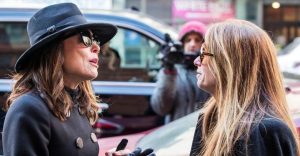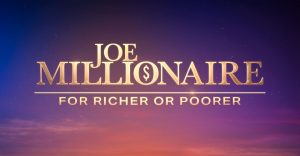Adam Mason Interview: Songbird

Songbird, the first film to go into production at the start of the pandemic, imagines a world where a COVID-19 has been allowed to grow and mutate into the year 2024. The thriller is now available through VOD, with KJ Apa and Sofia Carson leading an ensemble cast of intertwining stories that explore humanity’s resilience in the face of a crisis.
Writer-director Adam Mason spoke to Screen Rant about how he and co-writer Simon Boyes were inspired to start working on the film, how kismet KJ Apa’s casting was, and what he learned as a filmmaker from the restrictions played on the production.
This movie almost felt like watching a glimpse of our future. When did you and Simon Boyes start fleshing out the script and seeing where the story could go? Was it in the infancy of the pandemic?
Adam Mason: Yeah, on the very first day of the lockdown, Simon called me that morning. I was feeling very concerned and anxious about what was going on; I’ve got a wife and three little kids, and I’m 6000 miles away from my parents, so I can’t really see them with all that’s going on. I had all of these big concerns and stresses that I think everyone was feeling that day back in March of this year.
Simon called me that morning, and he basically said, that we should just get together over social media and come up with a movie. Simon and I would write the script, snd we would get the people we knew to record themselves using their iPhones and so on, and send me the footage. I would cut it together and, over a period of time, we would make a movie that way. It’s something that we’ve done many times over the past with no budget, no resources, just making a movie because it’s what we love to do.
That same day, which was the first day of lockdown in in LA, we wrote a document called Songbird. Half of it was a call to arms of how I thought we could make a movie during a lockdown, and the other half was what ultimately became Songbird. But in its first iteration, it was more of a monster movie – Cloverfield would be the closest comparison. That’s what we were going to make originally, and then I sent that 12-page document to Adam Goodman, who used to run Paramount and who was someone that I had met with about a few projects over the years. He was someone who I thought was a very savvy and forward-thinking producer. For some reason, I thought that he might gel with this idea.
It wasn’t like I was looking for money. We were originally gonna make Songbird for $0 and just put it together ourselves, but it was more that I just wanted to run it past him and see what he thought of the idea. The next day, he called me and said he wanted to greenlight the movie, which is the first time that’s ever happened to me so quickly. Two weeks later, Michael Bay came on board and it all just snowballed from there. What started as a very small, intimate idea that I was just going to do myself with Simon became Songbird.
How easy is it for you to go back and relive this movie, knowing where we are in the pandemic currently?
Adam Mason: It has been a very surreal and strange experience making the movie. It’s something that I wanted to make as a distraction from what was going on around me, but it’s something that I’ve thought about a lot. I mean, a lot of the things that we wrote in the original script ended up happening in real life and in real time around us.
I remember Simon and I were debating whether or not we should have a curfew in the movie, and part of us thought that it was too dystopian and that would never happen. Then that same day that we were writing into the script, there were helicopters flying over my house with loudspeakers announcing the 6pm curfew. Like I said, it was a really surreal experience putting the movie together.
Now you’ve seen the movie, hopefully you’ll share my opinion that ultimately it’s very hopeful and life-affirming. I was trying to make something that was really cathartic. It was really cathartic for me making the film, because I wanted to make something about trying for the human spirit. Ultimately, I think the movie’s got a really positive message, and that was something that was nice to throw the last eight months of my life into.

I know this movie had a lot of controversy surrounding it, with people thinking it was too soon. But after viewing this film, it’s a story of hope and never giving up. Where did some of these characters come from? What inspired the world-building for you?
Adam Mason: The Sara and Nico thing was twofold, I would say. Simon and I were both living in LA, and we’ve been here for almost 14 years now. When the pandemic hit and the lockdown kicked in, it was obviously very difficult for us to be so far away from our parents and loved ones. There was that real feeling of isolation and physical separation when we started writing Songbird.
Also, my cousin back in England had just started an online relationship with a girl in Argentina at the beginning of the year, and they were excited to finally get to meet up. They were planning to meet up in March, and then the lockdown kicked in London and Buenos Aires. They were unable to see each other, so they continued the infancy of this romance they were having over FaceTime and social media. It kind of struck me as this hopelessly romantic idea, with two people who really want to be together but through circumstance cannot. That was hugely the inspiration for Sara and Nico, which was kind of the backbone of the story.
We always knew that Nico was going to be the protagonist. He was in love with this girl, Sara, and it was a kind of Romeo and Juliet storyline. We thought of all the different story threads as different classics: there was Romeo and Juliet, Beauty and the Beast, and there was a Rapunzel storyline. We also knew that because the script was custom made with the restrictions of the lockdown and the pandemic in mind, everything was built from the ground up in terms of safety of the cast and crew.
One of the things that became apparent from the beginning was having natural separation between the characters so that they weren’t in the same room at the same time as often as possible. The separation between Nico and Sara, and between Dozer [Paul Walter Hauser] and May [Alexandra Daddario] – the fact that those characters are all isolated and alone and separated by the lockdown was something that was very inspired by what I was going through in real life. Also, it made practical sense in terms of the filmmaking side of it, as did having a larger ensemble cast of intercutting storylines the whole time.
I was very influenced by filmmakers like Robert Altman and John Cassavetes, in terms of the style in which I ultimately made the movie. There was a creative desire to make a movie like that, but it made a lot of sense from a practical point of view.
I love the line Dozer has in the film, where he says, “I was on lockdown way before it was fashionable.” What inspired the creation of his character, with being a soldier and suffering from PTSD?
Adam Mason: Simon and I were talking about how, as writers, we just spend so much time in our homes sitting in front of a desk with the terror of a blank sheet of paper in front of us. We’ve actually led these very isolated lives for the last 20 years; so much of my time is spent by myself trying to write. In a weird way, we were perfectly suited for what 2020 brought our way – in terms of the isolation of it.
Dozer was, in a lot of ways, inspired by the life of a writer. Even though he’s a soldier, we both very much related to that isolated life.
What did KJ Apa bring to the role of Nico that may have not been on the page?
Adam Mason: When it comes to casting, I really like to cast people who in real life remind me of the character that I’ve been writing. I think mainly because I’m a writer-director, there’s something really inspiring when you’re searching for the perfect person to play a role and then you meet them for the first time, and they immediately remind you of that character. It’s almost like, for the first time, you actually see the character that you’ve been imagining
In the case of Songbird, it was a couple of months before I met KJ. Every day, I’d been surrounded by the characters of the script and been trying to find the face of Nico, so to speak. I’ll be honest, I didn’t know who KJ was when our wonderful casting director brought his name up. She told me to check out Riverdale, which I’d never seen, but his character in Riverdale doesn’t look anything like I imagined Nico to be. As great as I think the show is and as great as I think KJ is in the show, I just couldn’t make the correlation between his character in Riverdale and this character that I’ve been writing for several months.
But she said, “Just take a Zoom with him and see what happens. He’s phenomenally talented, and he really loved the script.” He wanted to talk to me, so we Zoomed and within half a second to seeing him, I just kind of knew. It was really, really strange. He didn’t look anything like his character in Riverdale. He was staying in his truck; I think he was in Salt Lake City, just driving around America by himself, living out of his truck. His hair was really long, and he had a beard. I’d always imagined Nico being kind of a man’s man, and KJ in real life represents all of those things. But he’s also incredibly charismatic. I don’t think I’ve ever met anyone as charismatic as KJ. I defy anyone to meet him and not like him, because he’s an incredibly likable human being.
Within a second of talking to him, I felt like I’d just met Nico right off the page. I was really thrilled to be honest, because his casting was a huge component of Songbird. I knew that if I didn’t find the right Sara and the right Nico, that the movie had every chance of falling flat and being a bit shit. As soon as I found KJ, I was just thrilled. Then it turned out that he had visa issues, and it looked like he couldn’t do the film, which was just a disaster for me. He was off the agenda for a good few weeks in the build-up to starting filming, but just a couple of days before we were due to start the shoot, I got a call out of the blue. We still hadn’t found anyone, and I was feeling really desperate and convinced that I would never find the Nico that I wanted. Then KJ came back up on the radar, and I knew that everything was going to work out.

What did you learn about filmmaking during this film, when it comes to adjusting to new circumstances?
Adam Mason: Yeah, it was a really great creative experience. It was the best creative experience I’ve ever had, I would say, which was surprising to me because I honestly had no idea how we were going to pull it off. It really seemed like an impossible task right from the get go. But I come from a real guerilla filmmaking background. I’m fiercely independent and have done most jobs myself, in terms of being like a one man band when it comes to filmmaking.
I’m my own director of photography, I like to do my own lighting, I camera operate most of the time, I edit most of the time, I write and produce and direct. I’ve even done the music to my own films. I love being involved in every aspect of filmmaking, not because I think that I’m necessarily better than everyone else at any of those things. I’m quite certainly not. It’s just extremely rewarding for me, and I love being involved in the very conception of an idea all the way through to finishing it.
When it came to Songbird, we needed all of those things. It needed to be stripped down to its very essence, and we couldn’t have a big crew. It had to just be our Director of Photography, Jacques Jouffret, and me on set. We couldn’t have big movie lights, we couldn’t have a steadycam, we couldn’t have a dolly, we couldn’t have any of those things. Which coincidentally is the way that I always film my own stuff. I do a lot of music videos, and I filmed them in exactly that very stripped back style. Mostly because I don’t necessarily know what I’m doing in the way that a proper Director of Photography does.
But Jacques is a genius level version of what I do, as a layman when it comes to cinematography. He uses a lot of the same approaches, which is to just strip everything down to its essence. In a sense, all of the limitations of the of the movie, and the fact that we couldn’t have all of those things that you would normally have, allowed us so much creative freedom. It allowed me to put 100% of the focus on the performances and the actors.
Even though it was a low-budget movie that was shot in 17 days, which is incredibly fast by anyone’s standards – let alone during a pandemic in a lockdown – it wasn’t the kind of low budget movie where you’re only able to give an actor one or two takes. It was the opposite of that. It was almost like doing a piece of theater, where we would just pre-light every location and just follow the actors around. If they wanted to go to the left in one take and to the right in another, do two completely different things, I encouraged that amongst them. I just gave them complete freedom to explore the characters, and the world of Songbird. I created it for them like a palette, and then let them go wild.
Consequently, we ended up with a first cut of the movie that was a two and a half hour movie, with a shooting script that was 146 pages long. We just ended up with this wealth of material that, with the help with the great Michael Bay, we were able to carve down to 86-minute version that you saw.
I know that there was also some controversy with SAG-AFTRA having issued a Do Not Work order for the film. Is that correct?
Adam Mason: Yeah, that was a paperwork issue. It wasn’t anything to do with health and safety. I think that’s something that would have happened on any production; it wasn’t to do with the pandemic. The unions were actually fantastic to work with for us. All of the protocols that are now used on pretty much any production around the world didn’t exist when we started Songbird, because we were the first one back into production.
We were very much working with the unions to create those protocols. That was daunting and fascinating, and ultimately worked out really well. We didn’t have a single positive case during the shoot, which was a huge relief. Personally, I felt really safe making the movie. I like to say that I felt a lot safer on set than I ever do going to the supermarket, for example, just because the safety was taken so seriously on the movie.
Songbird is now available via VOD.

















